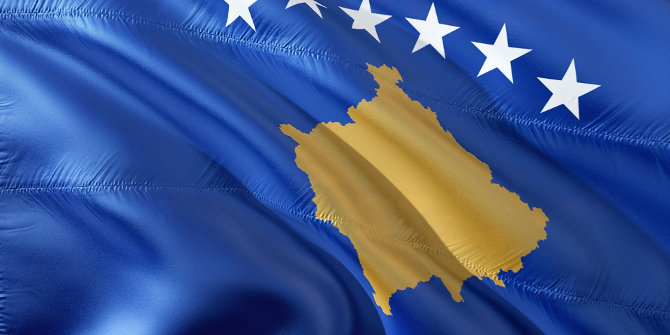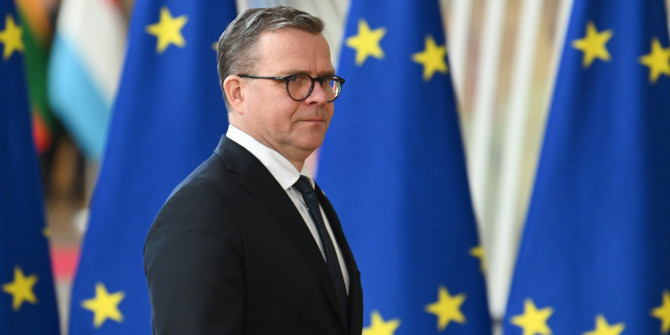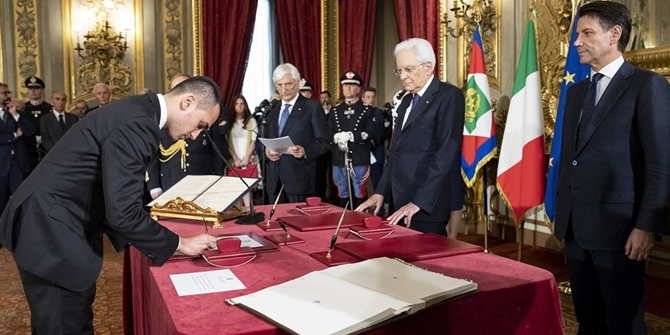The French far right party, the Front National, has been a perennial part of French elections for nearly 40 years, first under Jean-Marie Le Pen, and more recently his daughter, Marine. As part of our continuing series on the French elections, John Gaffney charts the intellectual history of the party and argues that Marine Le Pen has shed much of this legacy in order to rehabilitate the party to have a greater populist appeal.
One of the most interesting aspects of French presidential election campaigns since 1974 has been the presence of a Front National (FN) candidate – although in 1981, Jean-Marie Le Pen couldn’t quite get enough signatures to stand. In 2002, he even went through to the run-off against Jacques Chirac; and for a while in 2011, polls suggested that his daughter and successor, Marine Le Pen might make it through in 2012. But whatever its electoral fortunes, the FN has exercised huge influence on the French political scene. And its presence tells us much about the nature of the far right, and about French institutions and history; and presidential elections aside, the FN has helped define the French political landscape, has shaped the dynamics of the Fifth Republic, and been shaped by it.
This year, Marine Le Pen is the FN’s candidate – and this contest is the first real test of the special brand of detox she has imposed on the party. Detoxifying the brand was key to meeting the demands of a new and diverse electorate; but detoxifying the brand of a party so deeply connected to French history poses its own set of challenges, given the role of memory, of allegiances, and of ideas in the long tradition of far right French politics. Understanding the role and effects of these is key to setting the current FN in context, and to understanding its changing role.
The French far right has two ideological sources, two streams that irrigate it. The most visible today is ‘populist’, with its cult of the leader, and themes of law and order, anti-immigration, xenophobia, and the exclusion of the ‘other’. The second stream is its intellectual tradition, and it is this which distinguishes the French far right from so many of its sister movements in other countries, such as the UK, and offers us lessons in the study of politics
Intellectuals everywhere
The French far right is intelligent. This makes it the more compelling and the more disconcerting. Compared to, say, the BNP in Burnley or Nick Griffin’s appearance on the BBC’s ‘Question Time’, we are talking of some of the best and the brightest. Far right thought is a rich and textured seam in the French intellectual imagination. It emerged in part from the writings and philosophy of highly influential and intellectually respected reactionary thinkers like Chateaubriand and de Maistre who began, as it were, a right wing narrative – dialoguing with their adversaries over the next two centuries – in negative reaction to the French Revolution of 1789. And they dialogued. In and out of the right, centre right, and far right, and even the left. They are part of the landscape.
In the twentieth century, writers on the nationalist far right such as Maurice Barrès and Charles Maurras became enormously influential—and their influence was felt well beyond the right. Even today, the French intellectual class wrestles with its conscience over someone such as Louis-Ferdinand Céline, a fascist intellectual, a nasty antisemite, and yet a brilliant and innovative novelist. Not surprisingly, the triumph of the far right reached its zenith during the Nazi Occupation and Vichy France (1940-44).
But the point is that the far right were not ‘just’ collaborators (in fact, some of them, e.g. Jacques Perret, were in the Resistance); but they were essentially a part of that large swathe of the intellectual generation who came of age in the 1930s; the men (essentially men) who came to ideological and cultural power in 1940 constituted that part of the 30s generation that had opposed the French Popular Front of 1936, and had gone to fight against republican Spain. They found themselves, in fact, fighting their former classmates and fellow students. The good guys had, for us George Orwell, for the French, André Malraux – whose L’Espoir remains the left’s Spanish Civil War epic. But there was also Drieu la Rochelle’s Gilles, an equally brilliant piece of Spanish Civil War literature.
So we aren’t talking here of an obscure outer edge of French intellectual thought. Its influence was significant and multifaceted. Drieu was influence by Saint-Simon, Maurras by Bergson. Céline influenced Samuel Beckett and Sartre, Barrès influenced Malraux, de Gaulle was influenced by Maurras, as well as Barrès (and Chateaubriand), and it went on and on. Far right extremism is part of the fabric of French intellectual thought.
It goes off and it comes back
Mercifully, and understandably, French fascist thought took a nose dive after World War II, its antisemitism and general pro-Nazism got it hurled out into deep space; but it did not go away, and remained an ideological, in some ways, in its darkness, romantic, resource for many activists and thinkers, for the ‘nostalgiques de Vichy’, then in the 1950s, of Poujadism, and Algérie Française (and later the murderous OAS). It was from these disparate political and historical elements that Jean-Marie Le Pen emerged as the spokesperson and later the leader of the FN in the 1970s. And he was surrounded by all these tough guys, but also by many who drew upon France’s deeper philosophical traditions of rightist thought.
Far right philosophy evolved through the events of 1968 (that magic moment of the post war left/s, was also a dramatic moment for the far right in France – and many of today’s right wing politicians were politically ‘born’ in ’68). Through the 1960s and 70s, with the (more intellectual) ‘New Right’ and its many think tanks and writers (often at arm’s length from the FN itself), it interwove rightist and leftist thought, and even a kind of internationalism in its admiration for European ‘civilization’. It was part of the evolving ideational matrix of French political thought.
Marine and the ‘new’ FN
So, how does Marine Le Pen and the contemporary FN fit into this deep intellectual source? With difficulty. The populist side of FN radicalism has been maintained as the new party leadership has tried to find its way towards the political mainstream, and the older ideas are being forgotten.
Marine is good on TV, she’s a reasonable debater, and she seems to have chosen to walk away from lots of the right’s traditions and manners. But the detox also involves – apart from all the other things it involves – losing one’s intellectual tradition. Does this have advantages – for her and/or for those who oppose the FN? Marine Le Pen is ‘ordinary’, in fact, very and deliberately ordinary. She is, in the true tradition of the far right, a very forceful personality. But she’s a particular forceful, and a particular ordinary. She’s a twice divorced mum who lives with her partner and their respective kids. That is a far cry from far right values, in itself. And the fact that it is a woman leading this movement is fascinating, a movement whose philosophy and populism loves the leader, but never imagined it might be a female leader. But she is not like Joan of Arc, the FN’s female heroine. She has no visions. No grace inhabits her; she is more like a bossy and assertive middle manager at Asda.
She certainly doesn’t look as if – unlike her father – she has read Barrès or Voyage au bout de la nuit…. as have all French politicians and intellectuals. One gets the impression that not only has she not read them, she doesn’t give a toss either. If you asked her what her favourite piece by Céline was, she’d probably say ‘If Walls Could Talk’. She’s not elegant or classy. She may have been brought up in the posh suburb of Saint Cloud, but the deep and forceful, no nonsense voice is more girls’ night out than Parisian salon. And for the French, that might be of real significance, because they do have class, or pretentions to it, or at least expect it of others (hence so many of Sarko’s woes).
Detoxing, therefore, is having a strange effect. Pure populism is in the ascendant: it is anti-immigration, anti-Europe, anti-Islam, anti- well just about everything; and the booming, just-gave-up-the-fags-rasping voice of the FN’s new leader, and sometimes she is indeed reminiscent of her father when he used to lose his rag, is part of this new phase of the FN.
Is this the electoral way forward? Possibly. The Algérie française ‘community’ who poured back in March 1962 through Marseille and Orly, if you count the wider families now and the next generation on, is several million strong. But they don’t vote FN any more, or no more – proportionally – than the rest of the population; as they did in, say, 1965. The new FN electorate now is not insignificant at all, but it is disparate. And, as part of the detox, the FN is losing its ‘memory’. She and her team are struggling with the new potential support: women, younger women, older women, first time voters, first time voters who don’t want to vote, people who might vote Mélenchon, people who might vote Sarkozy, people who might vote… FN. If the ‘new’ FN doesn’t frame and fashion its new electorate, losing its historical memory might turn out to have dramatic consequences.
John Gaffney will be speaking at the UCL European Institute/Counterpoint event The French Presidential Election: Politics, Populism and Le Pen on 16 April. More details.
Please read our comments policy before commenting.
Note: This article gives the views of the author, and not the position of EUROPP – European Politics and Policy, nor of the London School of Economics.
_________________________________________
About the author
 John Gaffney – Aston University
John Gaffney – Aston University
John Gaffney is Professor of Politics at Aston University, and Co-director of the new Aston Centre for Europe. His two most recent publications are Political Leadership in France (Basingstoke: Palgrave Macmillan, 2010, paperback 2012) and Celebrity and Stardom in Postwar France (with Diana Holmes, Oxford: Berghahn, 2008, paperback 2011). He is currently a Visiting Professor at Sciences-Po, Rennes. Click here for John Gaffney’s website.






6 Comments